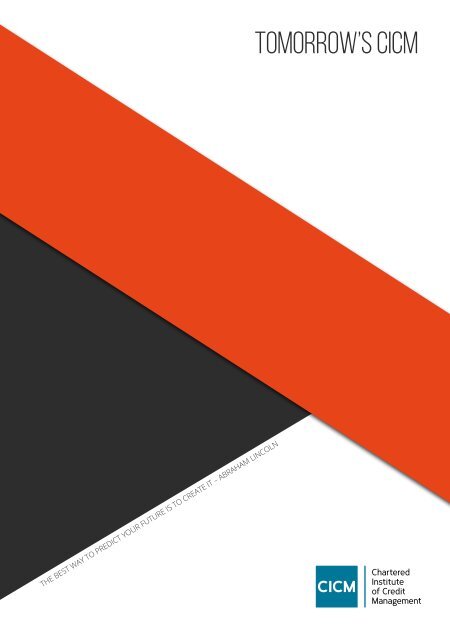SURVEY TO STRATEGY
You also want an ePaper? Increase the reach of your titles
YUMPU automatically turns print PDFs into web optimized ePapers that Google loves.
THE BEST WAY <strong>TO</strong> PREDICT YOUR FUTURE IS <strong>TO</strong> CREATE IT – ABRAHAM LINCOLN<br />
<strong>TO</strong>MORROW’S CICM
‘‘<br />
Chief Executive Philip King FCICM<br />
WITHOUT OUR MEMBERS,<br />
WE KNOW THERE IS NO<br />
CHARTERED INSTITUTE OF<br />
CREDIT MANAGEMENT
WELCOME<br />
Following the programme of research amongst CICM members<br />
earlier this year, Chief Executive Philip King shares its findings<br />
and sets out how the study is helping shape the future strategy<br />
and direction of the Institute.<br />
SINCE 1939, the Chartered Institute of<br />
Credit Management has always been<br />
the recognised standard in credit<br />
management.<br />
We tirelessly promote all aspects of credit<br />
management – from credit to collections to<br />
insolvency - and champion professional credit<br />
managers at every stage of their careers in<br />
supporting business growth across the whole<br />
spectrum of industry and commerce in the UK<br />
and internationally.<br />
As a charitable body, we take seriously our<br />
duties to advance the education of the wider<br />
public concerning credit management and the<br />
stewardship of a hardship fund for the benefit<br />
of members or former members who are in<br />
conditions of need, hardship or distress.<br />
We recognise that our members are our<br />
greatest asset. As we look to the future, we need<br />
to ensure that we remain relevant by embracing<br />
and addressing members’ needs, issues and<br />
concerns. We need to listen harder, talk more<br />
meaningfully and respond more precisely<br />
in order to remain an essential part of their<br />
everyday professional lives.<br />
Late in 2015 we embarked upon this journey,<br />
the starting point appropriately in the form<br />
of a programme of research amongst members.<br />
This has painted a clear picture of how CICM<br />
needs to evolve in order to continue to<br />
support and best serve members in this<br />
changing world, over the next few years and<br />
beyond.<br />
This is the start of the dialogue about where<br />
CICM is headed, our strategy, and how our<br />
members are helping shape their professional<br />
body. We believe the insight shared over the<br />
following pages is strong but, as always, we<br />
would welcome your views and feedback.<br />
Please feel free to email me at ceo@cicm.com<br />
Without our members, we know there is no<br />
Chartered Institute of Credit Management.<br />
01 <strong>TO</strong>MORROW’S CICM
INFORMING<br />
THE <strong>STRATEGY</strong><br />
All good strategies align the competencies and capabilities of an<br />
organisation with the needs of the market. Our own competencies and<br />
capabilities are encapsulated in the CICM Mission.<br />
Our Mission<br />
The Chartered Institute of Credit Management promotes excellence<br />
in credit management and raises awareness of its vital role in business<br />
and the community.<br />
BUT of greater importance is what does the<br />
market – our members and prospective<br />
members – need from a body such as<br />
CICM to remain relevant to them? And<br />
how do they perceive how we currently meet<br />
those needs and where should we be doing more<br />
or doing things differently?<br />
In other words, is CICM fit for purpose for<br />
tomorrow’s members?<br />
With that simple question in mind, and given its<br />
importance to the future of the Institute, we took<br />
the view that members needed to be consulted<br />
and in a way which would be open, independent,<br />
professional, rigorous and robust.<br />
In an unprecedented step, we selected an<br />
independent market research agency, Research<br />
by Design, to undertake the research in order to<br />
ensure complete objectivity.<br />
In all, over 1,000 of our members participated,<br />
not just in the online survey but in workshops<br />
and focus groups to ensure the right topics were<br />
examined and meaningful questions asked. To<br />
those who participated, thank you again for your<br />
time and thoughts.<br />
Full findings from the research were initially<br />
available in April 2016. Subsequently they have<br />
been discussed and reviewed over a significant<br />
number of sessions, some with the researchers,<br />
by the CICM HQ senior management team, the<br />
Executive Board, and the Advisory Council.<br />
THE RESEARCH PROGRAMME<br />
WAS DESIGNED <strong>TO</strong> LOOK AT:<br />
> The role, image and relevance of CICM<br />
> Members’ future aspirations for the Institute<br />
> Why members join and remain members<br />
> Expectations members have in terms of benefits, services<br />
and so on<br />
> Whether the current offer meets those expectations and<br />
any improvements<br />
> How CICM and CPD activity help members achieve their<br />
ambitions and professional development<br />
> Engagement with the Institute and reasons for it<br />
> Membership of other bodies<br />
‘‘we took the view that members<br />
needed to be consulted and in a way<br />
which would be open, independent,<br />
professional, rigorous and robust.’’<br />
02<br />
<strong>TO</strong>MORROW’S CICM
WHAT WE LEARNED<br />
- OUR MEMBERS’ PRIORITIES AND CONCERNS<br />
THE depth of insight members gave was<br />
generous, reassuring, illuminating and<br />
sometimes challenging. Above all it was<br />
extremely useful in informing the CICM<br />
strategic planning process and the Institute’s<br />
future direction.<br />
Overall, a significant proportion use<br />
positive words to describe the Institute, such as<br />
‘Professional’ (80%),‘Supporting’ (71%), and<br />
‘Progressive’ (52%), although some negatives are<br />
used such as ‘Old-fashioned’ (57%). This latter<br />
perception of being ‘Old-fashioned’ is something we<br />
need to understand better and will be undertaking<br />
further research to inform our thinking of how to make<br />
sure we can be more relevant to a younger audience.<br />
The Wordle shows adjectives members used<br />
to describe us; the larger the word, the more it was<br />
cited:<br />
Six key themes emerged<br />
from the research,<br />
summarised in the table<br />
and explored in more detail<br />
below. In turn they are to<br />
inform our future strategy:<br />
WHAT OUR MEMBERS <strong>TO</strong>LD US:<br />
1. We are rated higher than sector-average for satisfaction,<br />
recommendation, and value-for-money<br />
2. Members join for qualifications and to stay up-to-date<br />
3. Qualifications, knowledge acquisition, and representation<br />
are most important for retention<br />
4. Members want up-skilling in areas beyond technical<br />
5. CPD is important but should not be mandatory<br />
6. We should focus on raising awareness and the profile<br />
of credit management and CICM, and promoting<br />
qualification<br />
continued on next page<br />
><br />
03<br />
<strong>TO</strong>MORROW’S CICM
continued...<br />
><br />
We are rated more highly than sector-average for satisfaction,<br />
recommendation, and value-for-money<br />
64% rate CICM very highly – a quarter rating<br />
it ‘Excellent’. Against Research by Design’s<br />
benchmark, CICM significantly exceeds the<br />
norm for professional bodies.<br />
The reasons why are:<br />
> Industry updates<br />
> Credit Management magazine<br />
> Breadth of qualifications and educational<br />
resources.<br />
In the context of our profession, though, some<br />
criticise us for not being as well recognised as<br />
other member bodies such as CIMA or ACCA.<br />
Gaining and building recognition across our<br />
sector, profession and beyond is an area we are<br />
addressing and will continue to address.<br />
Over half of members find the Institute ‘Very<br />
Relevant’ to credit management professionals<br />
and a further 36% ‘Quite Relevant’.<br />
8% found us lacking in relevancy and, again,<br />
understanding the reasons why will be<br />
important.<br />
92% of members are either ‘Very’ or ‘Quite’<br />
likely to recommend CICM to non-members<br />
and again, the ‘Very Likely’ rating is ahead of the<br />
industry benchmark by some way.<br />
83% describe membership as good (53%) or<br />
very good (30%) Value for Money.<br />
Above all, 63% say they are proud to be part<br />
of CICM. This is especially the case amongst<br />
members who have been so for longer – they<br />
feel they have a sense of belonging with<br />
CICM, believe it is a significant part of their<br />
professional life and that they continue to get a<br />
lot from the Institute.<br />
Members join for qualifications and to stay up-to-date.<br />
There are many reasons why members join but four stand out<br />
by a long way:<br />
To aid my professional development<br />
through education and training<br />
To be part of the appropriate body<br />
for my professional interests<br />
To keep up-to-date and enhance<br />
my knowledge<br />
To access CICM qualifications<br />
The next highest reason given is ‘To meet and<br />
network with other CICM professionals’, some<br />
way lower at 34% (although for some of these<br />
56%<br />
60%<br />
59%<br />
59%<br />
members, passions run high and more such<br />
events, locally, were requested).<br />
Qualifications, knowledge acquisition, and representation are<br />
most important for retention. Similar reasons were given as to<br />
why they remain a member of CICM:<br />
To keep up-to-date and enhance<br />
my knowledge 62%<br />
To be part of the appropriate body<br />
for my professional interests 59%<br />
To aid my professional development<br />
through education and training 47%<br />
To access CICM qualifications 40%<br />
04<br />
<strong>TO</strong>MORROW’S CICM
Members want up-skilling in areas beyond technical<br />
There is a common feeling amongst a sizeable<br />
minority (35%) that ‘credit management’<br />
has an image problem in so much that many<br />
colleagues perceived it as a job rather than a<br />
career. Some recognise that CICM has done a<br />
lot to promote credit management as a career<br />
and that attitudes are shifting – but there is more<br />
work to be done by both CICM and members<br />
themselves.<br />
So, for example, to begin to meet career<br />
aspirations, members felt they needed other<br />
further skills beyond ‘technical’. Leadership,<br />
general management and project management<br />
skills were the most identified:<br />
Leadership<br />
39%<br />
General<br />
Management<br />
32%<br />
32%<br />
Credit management<br />
technical skills<br />
Influencing<br />
skills<br />
24%<br />
Project<br />
Management<br />
28%<br />
24%<br />
Analytical skills<br />
Continuing Professional Development is important<br />
Keeping on the career development theme,<br />
72% of members felt Continuing Professional<br />
Development (CPD) to be important in this<br />
regard (29% ‘Very Important’/43% ‘Quite<br />
Important’). However, only 22% felt it should be<br />
mandatory for CICM members and two fifths<br />
were undecided.<br />
05 <strong>TO</strong>MORROW’S CICM
We should focus on raising awareness and the profile of<br />
credit management and CICM, and promoting qualification<br />
Looking forward, over half of CICM members<br />
want to see the Institute focus on raising the<br />
profile of the profession amongst employers.<br />
This was highlighted widely in the research:<br />
> Participants felt credit management is<br />
often ‘the poor relation’ in the finance<br />
function<br />
> It is still too often seen as a back-office<br />
function<br />
> Senior management (employers) need to<br />
appreciate the role of credit management<br />
in improving cashflow and general financial<br />
performance<br />
“Nobody recognises us,<br />
we’re just there to collect<br />
money...”<br />
Profile raising is argued to have been most<br />
successful where good credit management<br />
has been shown to improve DSO, cashflow and<br />
profitability. Over four in ten also believe that<br />
CICM should promote its qualifications.<br />
Top ranked initiatives for CICM to focus on in the future<br />
Raising the profile of the credit<br />
management profession amongst employers<br />
Promoting CICM qualifications<br />
Sharing best practice<br />
Providing CPD (Continued Professional<br />
Development) and training<br />
Raising the profile of the credit<br />
management profession amongst employees<br />
Offering career support and advice<br />
Representing the interests of its members<br />
and the credit management profession<br />
Offering mentoring and coaching<br />
opportunities<br />
Online provision of training and resources<br />
45%<br />
36%<br />
35%<br />
31%<br />
27%<br />
27%<br />
27%<br />
26%<br />
51%<br />
06<br />
<strong>TO</strong>MORROW’S CICM
OUR<br />
RESPONSE<br />
BEING an organisation which listens and<br />
collaborates is at the heart of the Institute’s<br />
values, and members themselves are at the<br />
heart of the Institute. We must make sure that<br />
in creating the future for the Institute, it is based upon<br />
our shared view of that future.<br />
We have a genuine interest in ensuring that<br />
members’ aspirations, needs and relationship with<br />
CICM, as expressed through the research, are<br />
understood and met. It is our responsibility to do so.<br />
We asked, we have listened, we are learning and we<br />
will act accordingly.<br />
Of course we will need to prioritise. Some things<br />
can be achieved quickly, others will take longer.<br />
These are inevitably functions of ease-of-doing,<br />
development required and investment needed.<br />
The research has, reassuringly, shown us that<br />
members share our perception of what is most<br />
important and valuable to them. Future development<br />
is therefore very much an evolution of what we do<br />
and what we stand for, rather than any big change or<br />
‘revolution’. But there will be many new ideas…<br />
OUR<br />
<strong>STRATEGY</strong><br />
FUTURE<br />
Strategic Goals<br />
Our initial response has been to establish a set of core strategic goals to<br />
guide future development, based upon what we learnt:<br />
> To achieve global awareness of CICM and the value of professional credit management qualification<br />
> To create and support engaged and connected credit professionals<br />
> To position CICM membership as essential to practice<br />
> To position best practice credit management as vital to business success<br />
> To continue setting and promoting global industry standards<br />
> To continue meeting the changing needs of the industry and the credit profession<br />
> To introduce chartered member status.<br />
These will direct us to where we should focus development.<br />
If we get it right, they will permeate everything we do.<br />
.<br />
They will shape the Institute’s direction over the next three to five years, in line<br />
with our members’ career aspirations and requirements of the CICM.<br />
07<br />
<strong>TO</strong>MORROW’S CICM
THEPLAN<br />
So, what are we going to do? We have identified three core strategic objectives with a series of high-level<br />
initiatives as shown in the table below:<br />
Deliver high-value advice and support that is timely, relevant,<br />
essential and compelling<br />
> Create an online learning and knowledge environment<br />
> Build a framework to identify focus, priorities and delivery<br />
> Map qualifications and services clearly to career journey<br />
Raise awareness and profile of credit management, CICM and the skills<br />
of its members<br />
> Engage effectively with industry, business community and government<br />
> Promote brand and profession<br />
> Become clear thought-leaders<br />
Connect with our members in a way that builds relationships and<br />
delivers value and loyalty<br />
> Create an infrastructure to drive member engagement<br />
> Build knowledge based on effective capture, analysis and use of data<br />
Each initiative in turn has a plan of activities. Of course, financial, time and resource constraints will have<br />
an impact upon priorities and delivery. We will monitor progress, review and re-evaluate as necessary.<br />
As we introduce new initiatives, we will keep our members informed.<br />
WHAT SUCCESS<br />
LOOKS LIKE<br />
THE Institute asked, listened and learned<br />
about being fit for purpose for the future.<br />
Success will be all about continuing to be<br />
relevant to and engaged with members,<br />
attracting new members, continuing to provide<br />
the tools members need and ask for, and in a way<br />
which assures the future viability of the Institute.<br />
Undoubtedly, and most obviously, that will<br />
mean acting and delivering upon the Plan outlined<br />
earlier – making us absolutely essential to credit<br />
professionals at every stage in their career. That<br />
could be described as a ‘hard’ measure. And the<br />
Institute is certainly up for and capable of meeting<br />
that challenge.<br />
Equally important are softer measures, such as<br />
the way in which we behave towards our members.<br />
The most immediate way that manifests itself is<br />
through the way in which we would like members<br />
to be more included in the development of the<br />
Institute. The independent research programme is<br />
the start.<br />
We are also developing new ways to involve<br />
members, encouraging participation and<br />
feedback to this process and many activities.<br />
Again, we will continue to reach out to our<br />
members at the appropriate time and through the<br />
appropriate channels.<br />
08<br />
<strong>TO</strong>MORROW’S CICM
STAYIN<strong>TO</strong>UCH<br />
We continue to listen and learn from our members and always welcome<br />
feedback, observations and questions, especially if CICM has made or can<br />
make a real difference to you in your professional career.<br />
We will continue to involve members and encourage their input and<br />
engagement through all channels.<br />
Please do get in touch via ceo@cicm.com<br />
CICM Credit Community CICM_HQ CreditManagement<br />
Publisher:<br />
Chartered Institute of Credit Management, The Water Mill, Station Road, South Luffenham. OAKHAM LE15 8NB<br />
Telephone: 01780 722900 | Fax: 01780 721333 | Website: www.cicm.com |CMM: www.creditmanagement.org.uk<br />
09<br />
<strong>TO</strong>MORROW’S CICM
‘‘<br />
83% DESCRIBE MEMBERSHIP AS<br />
GOOD VALUE FOR MONEY –<br />
30% RATING IT AS ‘VERY GOOD’<br />
‘‘<br />
92% OF MEMBERS<br />
ARE EITHER ‘VERY’ OR ‘QUITE’<br />
LIKELY <strong>TO</strong> RECOMMEND CICM<br />
<strong>TO</strong> NON-MEMBERS


















